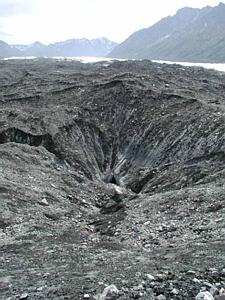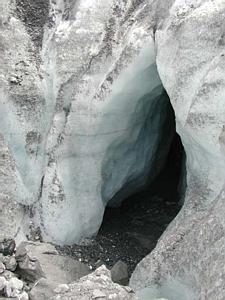2 August, 2000
August 2 , 2000
Matanuska Glacier, Alaska
Yesterday we looked at the samples from our fifth dye test. In this test
we went up the glacier to the same moulin with which we conducted our
unsuccessful conductivity experiments. We sampled from M-1 and Mega Vent
once again. The results were inconclusive but encouraging. There was a
slight trace of dye detected in one of the vents. We believe this to be
a good indication that a connection exists to this moulin as well. In
each of our previous dye tests we always had zero concentration readings
before and after the rapid rise and subsequent fall in dye
concentration. To see any measurable amount of fluorescence is taken as
a good sign. Our feeling is that the dye has been diluted too much with
the greater distance that it must now travel. Tomorrow we will repeat
the same experiment but with triple the amount of dye previously used.
Bob Bigl was back on the ice boring new holes again today and I once
again went along to watch and help whenever possible. Unlike yesterday,
todayís weather was cloudy and cold all day long. The chill was starting
to get to me worse than yesterday. At about 1:00 when the drilling was
well underway I decided to hike up glacier to warm up. I was certain
that there was a spot on the glacier where I would be able to look
around 360 degrees and be above it all. It appeared that such a place
existed when I looked at the glacier from the highway a few miles away.
I decided it would be easier to hike on the moraine than the ice. Itís
amazing how different the temperature is on the dark moraines compared
to the white ice. It wasnít long before I had peeled off my fleece
jacket and another shirt. The hiking was sort of like walking through a
series of small mountains. I was constantly having to look far ahead to
see if my progress might be stopped by a crevasse or ice cliff. I kept
heading toward the highest mound of ice and rock that was in sight at
any given time. Along the way I climbed up a couple to what I thought
would be the high point I was looking for only to spot one still farther
ahead that was even higher. I wasnít sure how long this would go on but
I continued nonetheless.
Finally I ascended a series of ridges that eventually led me to the
magic spot that I had hoped would really exist. I had been hiking toward
this point for more than an hour by now but it was certainly well worth
the effort. As I reached the top and looked over the other side I
quickly noticed an enormous moulin dropping immediately beneath my feet
like a huge crater. I noticed a spiraling ridge that went down to the
bottom and I followed it to an ice cave into which all the water was
flowing in. The sound of tiny water flows all around seemed amplified by
the surrounding walls. Looking up and all around toward the sky was sort
of eerie from deep inside this hole.
It is very difficult to get a sense of scale out there when everything
is so big. The terminus of the glacier bends around Mt. Wickersham which
rises nearly 6000 feet up from the glacier surface. It doesnít seem to
be such a big mountain because of so many others that tower much higher.
The glacier definitely looks big as you approach it and even as you walk
around on it. But it looked absolutely huge from my tiny rock summit
today. The mountains to either side of me seemed so distant. The parking
lot back at the terminus was so small now as to be unrecognizable. The
drill site looked like a tiny speck. I could tell that it would be a
very long walk to continue up the glacier just to get around the bend of
Mt. Wickersham, one that would require at least a backpack and overnight
provisions.
On my return hike I came upon an old metal canteen on which was stamped
U.S., A.G.M.Co., 1945. It was well dented all over from years of
movement on the glacier. I couldnít help but think that someone taking
this same hike some fifty years ago was just as impressed as I with the
size, beauty and power of this glacier.
Marvin Giesting

This is a panorama from several images looking east up the glacier valley from my high point on the moraine. Immediately in front is the large moulin. Going up the valley the glacier bends right (south) around Mt. Wickersham just to the right of the white ice.

This is by far the largest moulin I've seen out here but I've been told there are some real monsters out there. The ice cave at the bottom is partially visible.

Water drains into this ice cave at the bottom of the moulin. It's easily large enough to walk into but I didn't want to risk it. For as large as this moulin was it certainly did not have a whole lot of water feeding it. Interestingly the flow into the cave was upstream to the glacier itself.
Contact the TEA in the field at
.
If you cannot connect through your browser, copy the
TEA's e-mail address in the "To:" line of
your favorite e-mail package.
|
